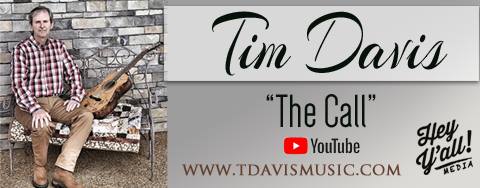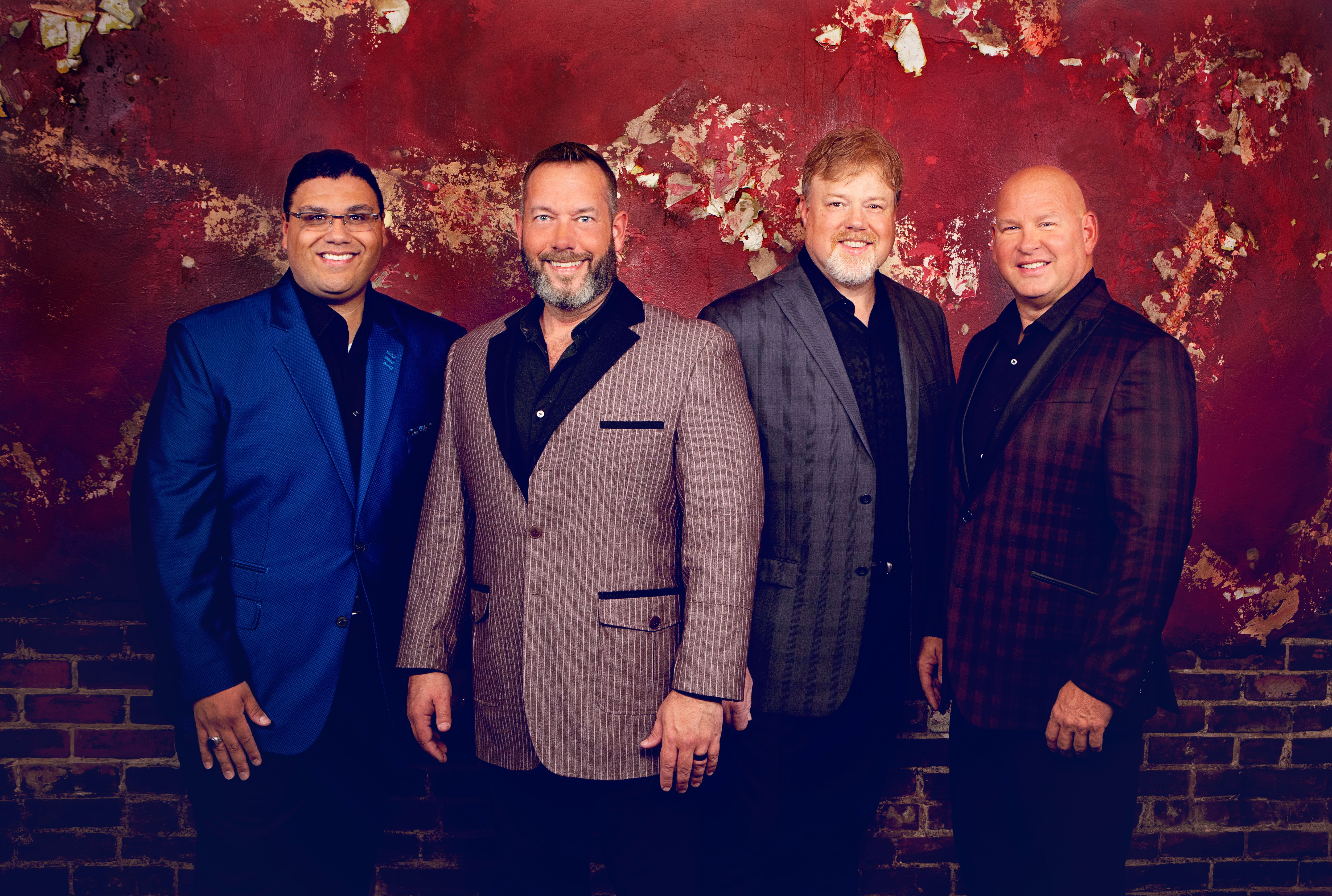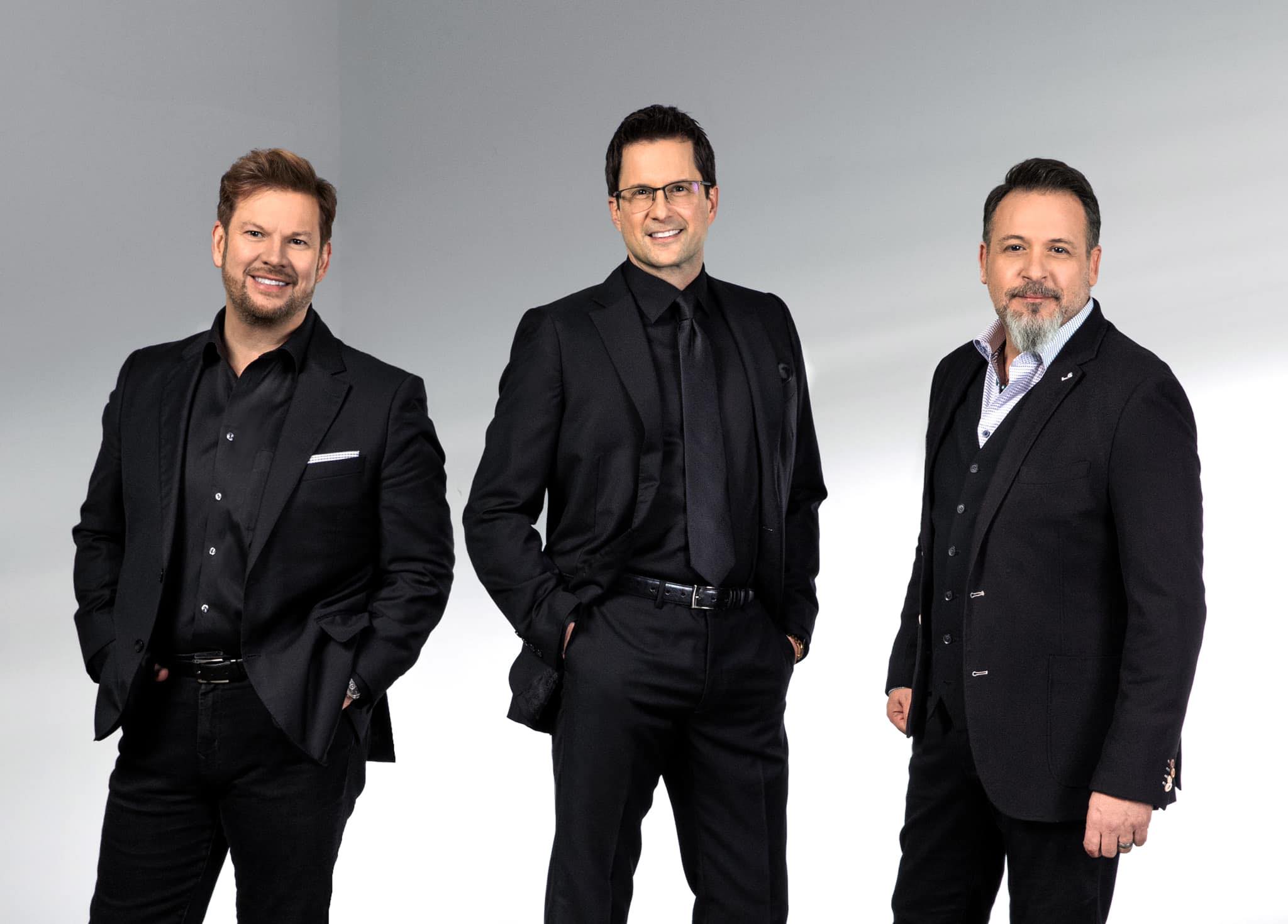 Gaither Vocal Band tenor continues to broaden his musical horizons
Gaither Vocal Band tenor continues to broaden his musical horizons
By Craig Harris
Mark Lowry doesn’t know what David Phelps sounded like as a freshman in high school.He’d guess that Phelps was already a vocal heavyweight even then. “I think he was good from the start,†Lowry said of his tenure with the Gaither Vocal Band. “I don’t really see that he’s grown in that sense musically. He had his (music) degrees way before he met us.â€
However, it was at that time when Phelps had a breakthrough of sorts. “When I became a teenager, I realized I was kind of rising above other people who were doing music,†Phelps said. “There was actually a moment for me in ninth grade. I sang for our town talent show (singing Sandi Patty’s ‘Bethlehem Morning’). They gave me a standing ovation. I remember getting in the car that night and saying ‘This is what I want to do with my life.’ It grew from there. I was invited to different churches and did concerts. My parents were driving me everywhere. My dad is a CPA (certified public accountant), and my mom is a professor. From those practical professions, they began to believe and encourage me. I just had this passion and drive to do it all of the time.â€
     He’s still doing it all of the time, currently in his second stint as a member of the Gaither Vocal Band.“It’s been just fantastic,†Phelps said. “When I joined the Vocal Band at first, Mark was there. That was always a high point with me, singing on stage with Mark Lowry. He’s fantastic and a comedic genius. It was a learning experience. I remember sitting in Waco, Texas, and watching Michael English winning Dove Awards and saying to Lori (Phelps’ wife), ‘Boy, I would love to be up there singing with him some day.’ I was thrilled to be singing with Michael English. What an incredible, iconic talent. He has helped so many vocalists in and out of the church. People have mimicked his style for a decade. Wes (Hampton) took my place when I left the Vocal Band. What a generous guy. He’s literally like a little brother to me. He’s become a really good friend of mine. It’s been great to see his talent really grow. Then, of course, Bill (Gaither) is just a songwriter of the century. It doesn’t get a whole lot bigger than that to stand on stage and see how he communicates with people. In all, it’s a pretty amazing experience.â€
    He’s still doing it all of the time, currently in his second stint as a member of the Gaither Vocal Band.“It’s been just fantastic,†Phelps said. “When I joined the Vocal Band at first, Mark was there. That was always a high point with me, singing on stage with Mark Lowry. He’s fantastic and a comedic genius. It was a learning experience. I remember sitting in Waco, Texas, and watching Michael English winning Dove Awards and saying to Lori (Phelps’ wife), ‘Boy, I would love to be up there singing with him some day.’ I was thrilled to be singing with Michael English. What an incredible, iconic talent. He has helped so many vocalists in and out of the church. People have mimicked his style for a decade. Wes (Hampton) took my place when I left the Vocal Band. What a generous guy. He’s literally like a little brother to me. He’s become a really good friend of mine. It’s been great to see his talent really grow. Then, of course, Bill (Gaither) is just a songwriter of the century. It doesn’t get a whole lot bigger than that to stand on stage and see how he communicates with people. In all, it’s a pretty amazing experience.â€
Lowry was introduced to Phelps back in 1997, which led to Phelps’ eventual hire.“A guy named David Estes at Word Records called me and heard that we were looking for a tenor,†Lowry said. “David had come in to Word and sang for them and thought he might be a good fit. I was going to be passing by Word at that time. I told him to tell him to be there in 20 minutes. I thought he was good. Bill said, ‘Well, have him make a cassette tape of some of our stuff,’ like ‘The King Is Coming.’ He did. Guy (Penrod, the group’s lead singer at the time) and I went over and met David at his house and sang with him to see how that would go.â€
    Phelps was leaning more toward a contemporary career at the time. “I grew up in a family where our musical style was pretty eclectic, everything from ‘80’s rock to classic country and definitely gospel,†Phelps said. “I fell in love with Contemporary Christian- It was Amy Grant, Russ Taff. I had recorded an independent project that was contemporary. In all of my growing-up years, people were telling me, ‘You need to get hooked up with the Gaithers.’ I never knew how to make that happen. I just keep singing. I had moved to Nashville. We were here about six months. I was still traveling (for concerts). It was difficult as a relatively unknown artist. I was in the middle of talks with a record label to do my first national release. One of the gentlemen there said, ‘Hey, did you know that the Vocal Band is looking for a new tenor?’ Jonathan Pierce had left. I said, ‘If you could make an audition happen, I would love to have a chance at that.’ Mark Lowry was on that label too. It was Word. He came up and listened.â€
   Phelps was leaning more toward a contemporary career at the time. “I grew up in a family where our musical style was pretty eclectic, everything from ‘80’s rock to classic country and definitely gospel,†Phelps said. “I fell in love with Contemporary Christian- It was Amy Grant, Russ Taff. I had recorded an independent project that was contemporary. In all of my growing-up years, people were telling me, ‘You need to get hooked up with the Gaithers.’ I never knew how to make that happen. I just keep singing. I had moved to Nashville. We were here about six months. I was still traveling (for concerts). It was difficult as a relatively unknown artist. I was in the middle of talks with a record label to do my first national release. One of the gentlemen there said, ‘Hey, did you know that the Vocal Band is looking for a new tenor?’ Jonathan Pierce had left. I said, ‘If you could make an audition happen, I would love to have a chance at that.’ Mark Lowry was on that label too. It was Word. He came up and listened.â€
Gaither added, “Mark Lowry had brought me a CD, and we were going on a cruise. We were looking for a tenor at the time. I asked Mark to tell him to go into the studio with just him and his voice. He did. We were overwhelmed.â€
Phelps was not overly familiar with Southern Gospel Music at the time.“I didn’t really know what Southern Gospel was,†Phelps said. “My family used to sing four-part harmony. I knew those things. I just didn’t know the industry as a whole. I was just doing my own thing. I was just kind of who I was. I am so grateful that Southern Gospel Music has embraced me. I have fallen in love with the icons of Southern Gospel Music. It was fantastic to get to know Vestal Goodman and Jake Hess. This music has people like no other genre. I had heard of Michael English and the Vocal Band, but I had lost track of the Vocal Band a little after Michael left. I had heard the songs that had come out of Southern Gospel. Stylistically, it really is such a wide range. Southern Gospel has embraced the Gaither stuff, which has a country flair to more of a Contemporary style at times.â€
Phelps joined the Vocal Band in July of 1997. “It’s truly affirming,†Phelps said. “That’s an important element to any artist’s journey. People ask me all of the time, “How do I get started in this? What is the magic pill?’ There is no magic pill. John Bisagno, who was a minister of music in Houston, gave me the best advice I ever got. I’m 6-foot-1, and my face was at his chest. He said, ‘Sing everywhere you can.’ That’s still the best advice I’ve ever been given. The people that end up doing this persevere.
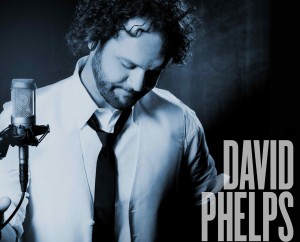   Phelps continued, “You learn from it. You learn what works and what doesn’t work, how far to push your voice, what to say on stage, what not to say on stage. The most important element of that is you learn to love what you do no matter whether the crowd is there or not. It’s about creating the art of what we do in the moment and creating the joy for people. What I’ve learned over the course of my career is it’s not always about the lyric. In Southern Gospel, we have lyric that is not only theologically and doctrinally sound, but it’s also in music itself. God created music. Beauty is in and of itself something that glorifies the Lord.â€
  Phelps continued, “You learn from it. You learn what works and what doesn’t work, how far to push your voice, what to say on stage, what not to say on stage. The most important element of that is you learn to love what you do no matter whether the crowd is there or not. It’s about creating the art of what we do in the moment and creating the joy for people. What I’ve learned over the course of my career is it’s not always about the lyric. In Southern Gospel, we have lyric that is not only theologically and doctrinally sound, but it’s also in music itself. God created music. Beauty is in and of itself something that glorifies the Lord.â€
Gaither added, “Everything is timing. A lot of people ask me what it takes. You have to have talent. You have to have training. You have to have a great deal of perseverance … but sometimes, it’s just timing.â€
Phelps left the Gaither Vocal Band in 2005 to pursue a solo ministry.“Before I left the Vocal Band, my goal was to define myself as an artist individually,†Phelps said. “I had actually gone to Bill and Barry (Jennings, the president of the Gaither Music Group) and said, ‘While I love being known as the tenor for the Vocal Band, I want your help in helping me define myself as an artist.’ They said, ‘Well, it’s about time you asked.’ Bill is a big part of my solo stuff. I had begun that road before I left. There were some difficult years in my solo work. To go from the first one (his self-titled project released in 2001) with ‘No More Night’ and ‘End of the Beginning,’ then, to go to Revelation, I don’t know whether it is Contemporary or whether it is Southern Gospel or if it’s just artistic. People would come to my concerts thinking they were going to get Vocal Band songs. That’s just not what I was as a solo artist. I still choose songs that fit me in both places.â€
Phelps continued, “When I left the Vocal Band, I really left for a few different reasons. No. 1, my family, we vowed that we were not going to let this career rule everything. My kids were growing up, and they were wanting me in their lives more than I was able to be. The other part was I was finding conflict in defining myself as an artist. Those three years were an incredible growth period for me.â€
Phelps performed almost as many solo dates as he did with the Gaither Vocal Band in 2013. “The beautiful thing about artistry is it comes in all different packages,†Gaither said. “The thing that makes the Vocal Band special is we have all this different talent. We use as many different approaches as we can to do what we do.â€
Phelps added, “It’s both satisfying and challenging. I am such an eclectic artist by nature. Doing the solo concerts really gives me a couple of different vehicles to drive. That’s very, very cool. I did two Vocal Band dates and two solo dates one week. They feed each other. Bill has been great to encourage that. Even in the days when we were doing 90 dates (each year) and singing for 18,000 people, he’s always been encouraging for the individual artists to go out and do what they do.â€
So, what brought Phelps back to the group?“By that third year, I was having a great time,†Phelps said. “We were having growth. Then, Bill called and said, ‘I want you to come meet with me and talk about coming back to the Vocal Band.’ I am never going to turn down Bill for coffee. I talked to Lori, and we both agreed that this is probably not the right thing. We just didn’t feel that this is the right thing to go back. I went and met with him, and in the first five minutes … I mean immediately … I was like, ‘God is doing something.’ I left there, and came home and talked to Lori. I told her that God is moving there. For the next couple of weeks, we prayed about it and talked about it. I told him that I would be happy to come back.â€
Phelps, English and Lowry joined Gaither and Hampton.“He’s really become a great friend,†Hampton said. “I’m so thankful that he came back. I think some people were like, ‘what’s it going to be like with two tenors now.’ It has been a wonderful relationship for us.â€
Phelps has extended some advice to Hampton, though only when it’s solicited. “He’s given me insight with stuff he has experienced, personal things he’s learned and just life in general,†Hampton said. “He really is like a big-brother figure to me. He’s helped me understand my voice a little better. It’s taking more ownership in my part. I’m taking more ownership and more authority when I’m singing stuff. That’s largely because of him.â€
While part of a vocal ensemble surrounded by talent, Phelps’ fellow group members are continually impressed by his vocal abilities.†I asked him one time, ‘what is your high note,’†Lowry said. “He said, ‘well, I don’t like to go any higher than E.’ I was like, ‘I don’t think you’ll need that.’ Michael English is one that moves me. David is so impressive. His voice is so stunning. Michael is equally stunning in a different way. Sandi Patty is another. There aren’t many (like that). It’s amazing to watch.â€
His consistency is another impressive aspect for his groupmates. “I have never heard a tenor who could do it that long and do it with the intensity and power he has,†Gaither said. “His training has paid off. Singing in that range is not easy, but he has the tones of a baritone. He’s one of a kind. The fact that he can do it every night is amazing. I’m very grateful he found us.â€
Hampton added, “It’s crazy. Marshall Hall (the group’s former baritone singer) and I were talking (recently), and David’s name came up. He can tell his voice to do whatever he wants it to do, and he can. He’s always been known for his high notes, but he’s really a baritone who has developed an amazing tenor range. He has a low speaking voice. His range is impressive. He’s freakish. He knows his voice so well. It really is crazy.â€
Hampton has a unique take on one of the reasons for Phelps’ powerful vocal ability. “He really is amazing,†Hampton said. “He and I joke around about it. He said he has a really large head. He tells me he can’t find hats big enough. He has a lot of space in that big head for that resonance to develop. God created him to be a singer.â€
     The group is currently in a transition phase as both English and Lowry have performed their final dates. “It’s easily a third of our life that we are spending out there on the road,†Phelps said. “It’s family. You get to that comfort level. That is always hard to let go of. It is the nature of this world. Nothing lasts forever. You have to say ‘What’s the next stage?’ The next stage has the potential to be better than we never dreamed. You have to say, ‘What is around the corner?’ You never know what’s in store for you on the next step.â€
    The group is currently in a transition phase as both English and Lowry have performed their final dates. “It’s easily a third of our life that we are spending out there on the road,†Phelps said. “It’s family. You get to that comfort level. That is always hard to let go of. It is the nature of this world. Nothing lasts forever. You have to say ‘What’s the next stage?’ The next stage has the potential to be better than we never dreamed. You have to say, ‘What is around the corner?’ You never know what’s in store for you on the next step.â€
The 44-year-old Tomball, Texas, native is excited about those possibilities. “We’re going to be bringing in two new members,†Phelps said. “That changes everything. We’re saying, ‘What is this going to be like?’ I’m of the thought – and so is Bill – that the personnel of the group defines who the group is. Whoever we bring in will definitely help define the group. That’s exciting.â€
Phelps added, “We have a new Vocal Band project that we are finishing up for the old group that is a hymns project. We’re working on that. We’ll have a video sometime in the next year and a new project. We’re all very excited about what the new personalities will breathe into that.â€
Lowry added, “Bill Gaither is not slowing down. He’s speeding up.â€
The Gaither Vocal Band’s latest project is Pure and Simple, a 2012 release.“My favorite Vocal Band stuff is the one where it’s the piano and the vocal group, like ‘That Sounds Like Home To Me’ … or ‘Lord Feed Your Children,’†Phelps said. “I love that one. I love the three-part harmony, making it work on the spot. That feeds me.â€
Phelps’ latest solo project was also released in 2012, entitled Classic. That came two years after Phelps recorded Family Band. Phelps wrote six of the songs on Family Band, a project in which he is joined by his sister (Sherri Proctor) and friend Jack Daniels. “I’ve worked to surround myself with family,†Phelps said. “My sister sang with me for years out on the road. Jack is my music director. I have another sister who plays classical trumpet professionally. My daughters (Callie and Maggie Beth) travel and sing with me when they are able to do so. It’s mainly Sherri, Jack and myself. It was a true labor of love and a joyful experience to put that down.â€
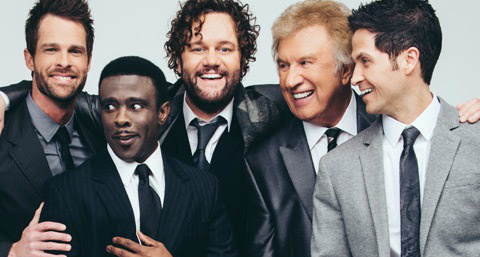     Phelps continued, “As a soloist, I’ve been doing the Classic stuff quite a bit, as well as the stuff that I have done in my career from ‘End of the Beginning’ to ‘No More Night’ to ‘Arms Open Wide.’ ‘Nessun Dorma’ was a real bench mark for me in my solo career. PBS (the Public Broadcasting Service) has opened its arms to me. That’s amazing to me. We’re going to explore that more and just walk through the doors God has opened in front of us.â€
    Phelps continued, “As a soloist, I’ve been doing the Classic stuff quite a bit, as well as the stuff that I have done in my career from ‘End of the Beginning’ to ‘No More Night’ to ‘Arms Open Wide.’ ‘Nessun Dorma’ was a real bench mark for me in my solo career. PBS (the Public Broadcasting Service) has opened its arms to me. That’s amazing to me. We’re going to explore that more and just walk through the doors God has opened in front of us.â€
In addition to his writing capabilities, Phelps also does production and vocal work in recording studios. He has recently been working on upcoming projects from Hampton, Charlotte Ritchie and the Martins (who are recording an A Cappella project). There are also some other elements to Phelps – who lives on an old dairy farm near Nashville, Tenn., with his wife and four children (including two sons, Grant and Coby) – that most individuals aren’t aware of.
“He’s a rancher,†Lowry said. “He has a farm. He has horses. He’s a good dad, a good husband, and he’s extremely funny. He’s one of the funniest people I’ve ever been around.â€
Hampton added, “I think a lot of people feel like he’s shy. As a fan before I joined the group, he seemed kind of guarded on stage from a fan perspective. He’s a private person, but in getting to sing with him for six years, he’s one of the funniest people I’ve ever known. He’s also a very compassionate person. I think you can hear that in his voice when he sings. He’s very compassionate and giving person.â€
For more information on David Phelps, visit: http://www.davidphelps.com/.
Written by Craig Harris
First published by SGN Scoops digital magazine January 2014.
